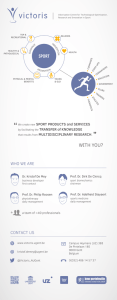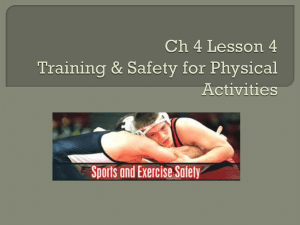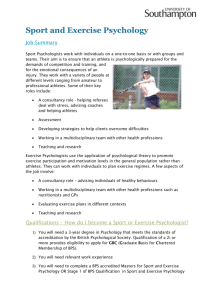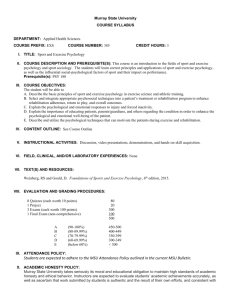Case studies of employability practice
advertisement
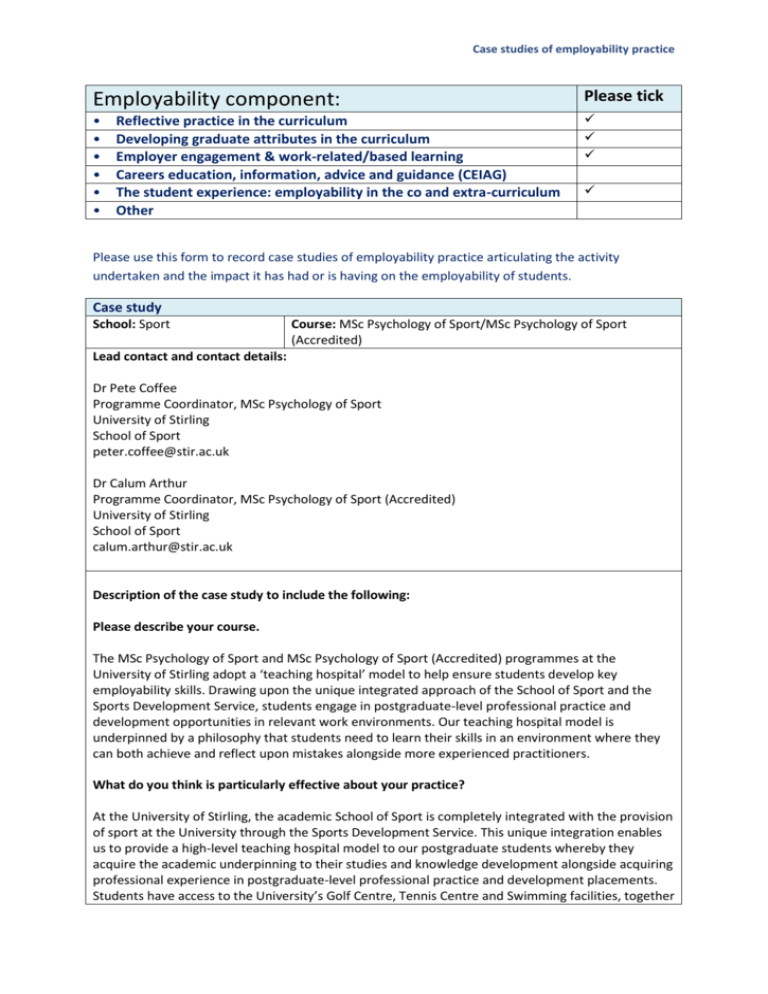
Case studies of employability practice Employability component: Please tick • • • • • • Reflective practice in the curriculum Developing graduate attributes in the curriculum Employer engagement & work-related/based learning Careers education, information, advice and guidance (CEIAG) The student experience: employability in the co and extra-curriculum Other Please use this form to record case studies of employability practice articulating the activity undertaken and the impact it has had or is having on the employability of students. Case study School: Sport Course: MSc Psychology of Sport/MSc Psychology of Sport (Accredited) Lead contact and contact details: Dr Pete Coffee Programme Coordinator, MSc Psychology of Sport University of Stirling School of Sport peter.coffee@stir.ac.uk Dr Calum Arthur Programme Coordinator, MSc Psychology of Sport (Accredited) University of Stirling School of Sport calum.arthur@stir.ac.uk Description of the case study to include the following: Please describe your course. The MSc Psychology of Sport and MSc Psychology of Sport (Accredited) programmes at the University of Stirling adopt a ‘teaching hospital’ model to help ensure students develop key employability skills. Drawing upon the unique integrated approach of the School of Sport and the Sports Development Service, students engage in postgraduate-level professional practice and development opportunities in relevant work environments. Our teaching hospital model is underpinned by a philosophy that students need to learn their skills in an environment where they can both achieve and reflect upon mistakes alongside more experienced practitioners. What do you think is particularly effective about your practice? At the University of Stirling, the academic School of Sport is completely integrated with the provision of sport at the University through the Sports Development Service. This unique integration enables us to provide a high-level teaching hospital model to our postgraduate students whereby they acquire the academic underpinning to their studies and knowledge development alongside acquiring professional experience in postgraduate-level professional practice and development placements. Students have access to the University’s Golf Centre, Tennis Centre and Swimming facilities, together Case studies of employability practice with studying in an outstanding environment with supportive staff. Our industry partners and employers have told us they seek individuals with knowledge and experience, and our teaching hospital approach provides our students with both of these key elements. Employability, following postgraduate studies, is a key driver for the teaching hospital model that we employ. Opportunities are embedded for students to gain the experience that employers desire. Our teaching hospital approach to learning is embedded throughout the programme, and is led through a dedicated Professional Practice and Development module in which students engage in postgraduate-level professional practice and development placement. The module provides students with opportunities to analyse and reflect on professional practice and development, and topics include self-analysis, reflective practice, action planning and ethics, and professional standards. The assessments for the module comprise a written essay and portfolio of practice based on professional practice and development experiences, and a postgraduate-level job application and interview. A student on the programme has said the following about the assessments: “The assessments were excellent, personally I have never had to write a CV or cover letter in this format and it has provided invaluable experience that I will be able to use not only for job applications but also provided me the opportunity to clearly identify both my strong and weaker skill sets and attributes. This identification will greatly assist my further education and focus my future goals. This task also provided invaluable focus on selling yourself in a competitive market. The mock interview was also a first and again provided valuable experience. The second part of the assessment provided the structure to systematically identify current and future goals, it also provided experience scheduling and reflecting on achievements. Overall the skills gained from this module have been instrumental in increasing my employability.” Overall benefits to your students? The Professional Practice and Development placements are of postgraduate-level and are focussed upon a specialised area of knowledge, the psychology of sport. Through the distinctive structure of an integrated academic and sport service, we are able to provide postgraduate students with access to high-level sport psychology experiences. This means students have the opportunity to acquire their knowledge and demonstrate subject-specific (sport psychology) skills with elite athletes who compete very close to or at the highest levels in sport. Students are provided further opportunities through a dedicated Applications of Sport Psychology module. As part of this module students engage in practical sessions at the Sports Development Service Golf Education Centre, providing them with an opportunity to test their knowledge. The experience and opportunity to work with elite players and coaches is invaluable – it is the elite level of the athletes and coaches that makes the opportunity truly unique. One student said: At the Golf Centre, through the Applications of Sport Psychology module, I was given a chance to practise my skills and the knowledge I have learned with elite athletes and coaches; it’s excellent. Within placements students work alongside experienced practitioners in an environment where they can both achieve and reflect upon mistakes, developing their knowledge and experiences with elite athletes. They have opportunity to use their initiative and take responsibility, solve problems in creative and innovative ways, make decisions in challenging situations, and develop professionally. Case studies of employability practice The Performance Golf Coach at the Golf Centre also commented, “The students from the MSc Psychology of Sport work with our elite golfers within a safe and supervised environment. Because of the level of the athletes we work with, it’s essential that we provide an equally high level of ‘knowledge’ in our service. These placements, therefore, are only suitable for postgraduate-level students and beyond.” Specific, tailored postgraduate level professional practice and development opportunities, through our teaching hospital model, provides graduates on the programmes with the skills to move into a broad range of postgraduate career opportunities, including a number of sport and health professions, posts within a number of fields in the science industry, to careers within the civil service and government. Overall benefits to you? Stronger links with industry are provided for the School of Sport.




